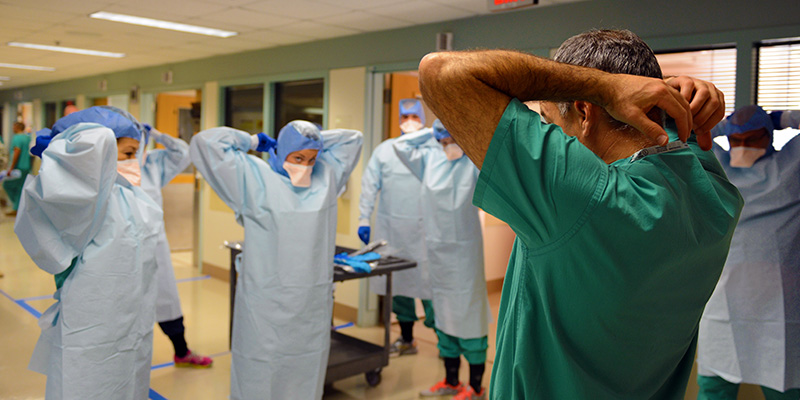
(Photo: U.S. DoD)
For several years California’s healthcare industry has been sounding the alarms about the shortage of workers. That need has become more urgent as more Californians test positive for COVID-19, the Coronavirus. Futuro Health, a new non-profit aiming to train the largest network of certified healthcare workers, has announced new partnerships to address the pressing need to fill that workforce gap.
“The pandemic is bringing to light the importance of the health workforce,” said Futuro Health CEO Van Ton-Quinlivan. “With our partners, we will work to fortify the care teams at the front line and help redeploy talent sidelined by the pandemic.”
Futuro Health was formed through a new partnership between Kaiser Permanent and Service Employees International Union-United Healthcare Workers West (SEIU-UHW) earlier this year. Its aim is to graduate 10,000 new licensed, credentialed allied health care workers in California over the next four years through an affordable education-to-work solution.
Last week the non-profit announced it has added new partners in that goal including the Bay Area Medical Academy, California Community Colleges’ California Virtual CampusOnline Education Initiative, InsideTrack, MTI College, Pima Medical Institute, and Voxy. Western Governors University was previously announced as a partner.
Ton-Quinlivan added, “Our combined efforts can accelerate the transition of individuals into healthcare roles, as well as equip current workers with skillsets needed for this moment of crisis.”
Before the pandemic hit, it was estimated that California would need 500,000 new healthcare workers by 2024. That’s just one example of why the California Economic Summit has prioritized supporting an infrastructure that will allow people to learn new skills quickly and affordably and become competitive in the job market. The workforce priorities in the Summit’s 2020 Roadmap include:
- Work with the Newsom Administration to establish a grant program that will encourage early adopters to measurably demonstrate the benefits of integrated “Cradle to Career” approaches.
- Support the establishment of Regional Talent Development collaboratives built upon a stronger regional business intermediary system. This system will be designed to enrich the efforts of regional training providers and other workforce entities.
- Mobilize support for pending legislation that provides community college students with additional direct financial resources and basic needs assistance so they can afford to enroll and succeed in college.
The public-private partnerships that Futuro Health and others are forming to fill workforce gaps have taken on added urgency along with the alignment with the goals of the Summit. “We are watching Futuro Health reshape the learning ecosystem and bring together quality partners intent on improving the adult student journey toward a credential helpful to our nation’s healthcare system,” said William D. Hansen, CEO of Strada Education Network. “It's now clearer than ever that a strong healthcare workforce is vital to our national safety and security.”

